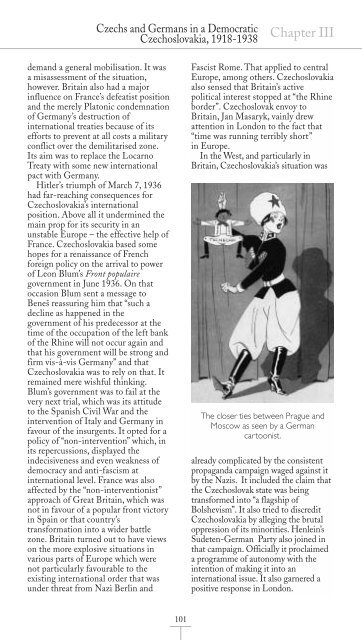the nationality of all inhabitants of the czech provinces and ...
the nationality of all inhabitants of the czech provinces and ...
the nationality of all inhabitants of the czech provinces and ...
Create successful ePaper yourself
Turn your PDF publications into a flip-book with our unique Google optimized e-Paper software.
Czechs <strong>and</strong> Germans in a Democratic<br />
Czechoslovakia, 1918-1938<br />
dem<strong>and</strong> a general mobilisation. It was<br />
a misassessment <strong>of</strong> <strong>the</strong> situation,<br />
however. Britain also had a major<br />
influence on France’s defeatist position<br />
<strong>and</strong> <strong>the</strong> merely Platonic condemnation<br />
<strong>of</strong> Germany’s destruction <strong>of</strong><br />
international treaties because <strong>of</strong> its<br />
efforts to prevent at <strong>all</strong> costs a military<br />
conflict over <strong>the</strong> demilitarised zone.<br />
Its aim was to replace <strong>the</strong> Locarno<br />
Treaty with some new international<br />
pact with Germany.<br />
Hitler’s triumph <strong>of</strong> March 7, 1936<br />
had far-reaching consequences for<br />
Czechoslovakia’s international<br />
position. Above <strong>all</strong> it undermined <strong>the</strong><br />
main prop for its security in an<br />
unstable Europe – <strong>the</strong> effective help <strong>of</strong><br />
France. Czechoslovakia based some<br />
hopes for a renaissance <strong>of</strong> French<br />
foreign policy on <strong>the</strong> arrival to power<br />
<strong>of</strong> Leon Blum’s Front populaire<br />
government in June 1936. On that<br />
occasion Blum sent a message to<br />
Beneš reassuring him that “such a<br />
decline as happened in <strong>the</strong><br />
government <strong>of</strong> his predecessor at <strong>the</strong><br />
time <strong>of</strong> <strong>the</strong> occupation <strong>of</strong> <strong>the</strong> left bank<br />
<strong>of</strong> <strong>the</strong> Rhine will not occur again <strong>and</strong><br />
that his government will be strong <strong>and</strong><br />
firm vis-à-vis Germany” <strong>and</strong> that<br />
Czechoslovakia was to rely on that. It<br />
remained mere wishful thinking.<br />
Blum’s government was to fail at <strong>the</strong><br />
very next trial, which was its attitude<br />
to <strong>the</strong> Spanish Civil War <strong>and</strong> <strong>the</strong><br />
intervention <strong>of</strong> Italy <strong>and</strong> Germany in<br />
favour <strong>of</strong> <strong>the</strong> insurgents. It opted for a<br />
policy <strong>of</strong> “non-intervention” which, in<br />
its repercussions, displayed <strong>the</strong><br />
indecisiveness <strong>and</strong> even weakness <strong>of</strong><br />
democracy <strong>and</strong> anti-fascism at<br />
international level. France was also<br />
affected by <strong>the</strong> “non-interventionist”<br />
approach <strong>of</strong> Great Britain, which was<br />
not in favour <strong>of</strong> a popular front victory<br />
in Spain or that country’s<br />
transformation into a wider battle<br />
zone. Britain turned out to have views<br />
on <strong>the</strong> more explosive situations in<br />
various parts <strong>of</strong> Europe which were<br />
not particularly favourable to <strong>the</strong><br />
existing international order that was<br />
under threat from Nazi Berlin <strong>and</strong><br />
101<br />
Chapter III<br />
Fascist Rome. That applied to central<br />
Europe, among o<strong>the</strong>rs. Czechoslovakia<br />
also sensed that Britain’s active<br />
political interest stopped at “<strong>the</strong> Rhine<br />
border”. Czechoslovak envoy to<br />
Britain, Jan Masaryk, vainly drew<br />
attention in London to <strong>the</strong> fact that<br />
“time was running terribly short”<br />
in Europe.<br />
In <strong>the</strong> West, <strong>and</strong> particularly in<br />
Britain, Czechoslovakia’s situation was<br />
The closer ties between Prague <strong>and</strong><br />
Moscow as seen by a German<br />
cartoonist.<br />
already complicated by <strong>the</strong> consistent<br />
propag<strong>and</strong>a campaign waged against it<br />
by <strong>the</strong> Nazis. It included <strong>the</strong> claim that<br />
<strong>the</strong> Czechoslovak state was being<br />
transformed into “a flagship <strong>of</strong><br />
Bolshevism”. It also tried to discredit<br />
Czechoslovakia by <strong>all</strong>eging <strong>the</strong> brutal<br />
oppression <strong>of</strong> its minorities. Henlein’s<br />
Sudeten-German Party also joined in<br />
that campaign. Offici<strong>all</strong>y it proclaimed<br />
a programme <strong>of</strong> autonomy with <strong>the</strong><br />
intention <strong>of</strong> making it into an<br />
international issue. It also garnered a<br />
positive response in London.


